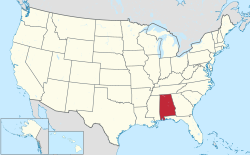 | |
| Number of elections | 51 |
|---|---|
| Voted Democratic | 29 |
| Voted Republican | 16 |
| Voted Democratic-Republican | 1 |
| Voted other | 2 [a] |
| Voted for winning candidate | 27 |
| Voted for losing candidate | 24 |
Following is a table of United States presidential elections in Alabama, ordered by year. Since its admission to statehood in 1819, Alabama has participated in every U.S. presidential election except the election of 1864, during the American Civil War, when the state had seceded to join the Confederacy.
Contents
- Elections from 1864 to present
- Election of 1860
- Elections from 1828 to 1856
- Election of 1824
- Election of 1820
- See also
- Notes
- References
A socially conservative Deep South state, Alabama was dominated by the Democratic Party for most of its history, voting almost exclusively Democratic from the founding of the party in the 1820s until the Civil Rights Movement in the 1960s. Since the 1980s, the state has become heavily Republican, like most of the south.
Notably, Alabama has also almost always voted for the same presidential candidate as neighboring Mississippi. In more than two hundred years of presidential elections, they have supported the same candidate in all but one; the election of 1840, when Mississippi voted for William Henry Harrison and Alabama for Martin Van Buren (in 1868, only Alabama participated, as Mississippi had not yet been readmitted to the Union).
Winners of the state are in bold. The shading refers to the state winner, and not the national winner.